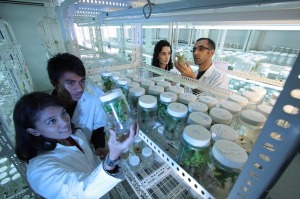Translating deep thinking into common sense
When Science Meets Philosophy

By Robin Craig
October 15, 2014
SUBSCRIBE TO SAVVY STREET (It's Free)
The roots of science lie in objective philosophy.
Richard Feynman once said that the philosophy of science is as useful to scientists as ornithology is to birds. This is true—of philosophy which is cut off from reality, or which replaces thinking with description by defining science as ‘what scientists do’. But that is not what philosophy should be.
Science is not an invention out of thin air that stands on its own in isolation from the rest of philosophy. Rather, the roots of science lie in objective philosophy and therefore, far from science being independent of philosophy, philosophy lays its foundation and defines its context. We will now look more closely at the implications of this.
A Moral Vacuum
In Dan Brown’s novel Angels & Demons, a priest admits the spectacular success of science, but points out that for all its power, by providing no guidance in its use it makes religion even more important. (Similar arguments were analysed in my Philosophical Reflections 6)
One might as well claim that cars are defective because they can’t drive themselves. The only questions science is concerned with are those of fact: what is true? But this does not leave science adrift in a moral vacuum, because it is a derivative of a rational, objective philosophy. The criticism might have force if rational philosophy itself could not guide people in how to live or how to use the power science gives them. But as we have already seen (e.g. in Good Without God), there is a rational morality of reason, justice, and individual rights, which can guide the use of science in the service of human life.
Scientific Ethics
Because science does not stand outside human life or philosophy, it has the same ethical principles as anything else. But certain aspects are more stressed: those pertaining to its animating principle and its power.
As the animating principle of science is truth, the virtue of honesty is vital. The motto of scientists should be ‘Discover the truth, without fear or favour’—letting nothing stand between their mind and reality or their mind and what they say (given the context of political freedom). Fraud, the suppression of unexpected or unwelcome results, and other forms of dishonesty should be anathema to a scientist’s character.
Will my work serve human life, or its destruction?’
But like any principle, that is only meaningful in context: it cannot negate more basic ethical principles such as justice and individual rights. Indeed, because science is so powerful, it greatly amplifies the ability of those who possess it to do good—or evil. Therefore, scientists have a great moral responsibility to work on knowledge that serves good, not evil. For a scientist to willingly serve a dictator or a criminal is to be worse than their master, because they greatly increase the evil that master can do.
That does not mean that anything that might be used for ill should not be done: that would be to live negatively by fear instead of positively by the pursuit of values. One can invent a rocket to launch a satellite or deliver a warhead; and a warhead can be used to defend a free country or enslave one. Scientists must consider both the potential benefits and potential abuses of the knowledge they discover, and always ask: ‘Will my work serve human life, or its destruction?’
This principle is not a concession to those who attack scientists who experiment on animals, work on human embryos, or study how best to exploit nature. On the contrary, it is only an objective ethics based on the value of human life that should guide scientists (or anyone else) in what they should do. Like everyone, scientists should not work on what they personally think is immoral—but they should be as careful to objectively define the morality they are working under as they are in the work they do in its service.
Evaluating Science
Scientific thinking is needed both by scientists to do their job and by non-scientists to evaluate and understand it. The primary tool here is to understand the general laws of induction, including statistics (see Philosophical Reflections 27). In addition, there are questions pertaining specifically to the scientific method. Were proper controls included? Were tests done to try to disprove the theory, or was only supporting evidence sought? Were other possible theories tested? Has a coherent picture been developed or are there unresolved contradictions or mysteries in the evidence?
Only then can one properly evaluate whether the evidence as presented actually supports the conclusions claimed, and if so, how well. If the question is something like “were dinosaurs warm-blooded?” you might not really care: except that if you are interested in the question, you should be interested in the truth of the answer. But it certainly matters when it affects your life or happiness. Consequently, it is especially important where science is used to justify laws to control human action. There, proof of objective harm compared to the alternatives is an absolute requirement—else the law is perverted into an initiator of force against the innocent, instead of their defender.
Vested Interests
Because science is an objective process, the truth will eventually out, but that doesn’t mean there can’t be distortions along the way. Such distortions may arise from being more certain than the evidence objectively allows, or simply being stuck on the wrong path due to difficulties in obtaining quality evidence at all. Perhaps the most insidious cause is bias from an agenda separate from the pursuit of truth. This is another reason why being able to evaluate scientific claims is an important skill.
When people think of vested interests, they often think of scientists paid by drug, oil, or tobacco companies. However potential bias is by no means restricted to that.
Much science is publicly funded, so scientists require grants to do their work, and the demand for research money greatly exceeds supply. Plainly, research into big problems is not only more exciting, but also the most likely to attract money (and even fame). Therefore, publicly-funded scientists have a motive to play up the importance of their research. This reaches its most dangerous expression in ‘bandwagon science’, where more and more people jump in, generating an expanding special-interest group with a vested interest in the existence and severity of a problem (of course, a bandwagon might be justified). Sometimes this happens because an inadequate preliminary study indicates that there might be a problem, after which no amount of negative results will put an end to it (the supposed dangers of mobile phones and MMR vaccines spring to mind here).
Funding is not the only or even the major issue. A scientist’s personal philosophy and values may be unknown—or considered ‘idealistic’—yet can be a far more powerful motivator. Consider an environmental scientist who believes in the intrinsic value of untouched nature that supersedes man’s rights and interests. The temptation to ignore data or inflate sloppy research is bad enough when all one is pursuing is a favorite theory (Darwin’s famous warning on that springs to mind)–how much worse is it when we know we are right and are trying to save the world?
However, the mere existence of a vested interest of any sort does not, by itself, imply bad science. So how does one evaluate such matters? In the same way as any science: by evaluating whether the evidence is inductively sufficient. The issues are how good the evidence is for the factual conclusions, and disentangling the facts from the scientist’s personal evaluation of the facts.
Weather Balloons

Climate change may be the biggest bandwagon of our time, and so provides a pertinent example of the kinds of questions to ask when evaluating scientific claims. While it is definite that atmospheric carbon dioxide levels have been rising and there is a small rising trend in average global temperature, the cause and effect relationships, and what if anything we can or should do about it, are cloudier.
From my reading of it, the areas of ignorance are significant. The carbon cycle is not really understood: e.g., why can’t it cope with the relatively small human excess of CO2? The causes of past climatic fluctuations are not understood in detail: e.g., why over the last few hundred millennia were there periods both hotter and colder than now? Further to that, why do ice cores indicate that temperature changes precede greenhouse gas changes, in both directions: an effect tellingly repeated in our era, in which most of the global temperature increase was before most of the CO2 increase? So is the temperature rising because of CO2 release, or is CO2 increasing because temperatures are, or both? Or are both caused by something else entirely? Why is Mars also apparently warming, as evidenced by its shrinking polar ice? And if humans are warming the Earth, will that cause net problems, net benefits—or even delay or prevent the far greater disaster of another ice age? Furthermore, if there are net problems from warming—human-caused or not—are there technological methods to counter it, rather than throttling industrialisation and thus greatly harming human life?
All the ‘consensus’ in the world cannot compensate for inadequate inductive evidence
These are the kinds of questions that climate science should be able to answer convincingly, objectively, and quantitatively before its conclusions can be regarded as more than tentative. Until then, it is not a mature science, but remains at the murky boundary between speculative hypotheses and ignorance where ‘paradigm shifts’ thrive: the paradigm might turn out right, but it would be unwise to rely on it. All the ‘consensus’ in the world cannot compensate for inadequate inductive evidence. And more: in the absence of such evidence there should be no consensus.
Philosophical Science
While science and philosophy overlap, in general the role of philosophy is to discover the broadest abstractions and principles about reality, and the role of science is to discover its detailed facts. Thus, beyond identifying basic axioms, which cannot be violated, and basic principles on which science is founded, philosophy cannot pre-empt the results of science. This is because such detailed knowledge cannot be found by rationalistic deduction from first principles, but only by using an inductive process to look at reality: and science is that process.
In fact the influence is mainly in the other direction, with the findings of science delimiting valid philosophies. For example, mystical philosophies are inconsistent with science’s knowledge of how the world operates by natural law, and philosophy’s view of man including questions of determinism and free will can be informed by the findings of neuroscience.
Nevertheless, where absolutes and axioms are involved, philosophy can have a direct input into scientific theories. While it is risky to wade into such waters—not because the axioms might be wrong, but because one might misapply them due to insufficient knowledge—it is worth discussing some of these in order to illustrate how philosophy can directly inform science (there is more on this topic in Philosophical Reflections 33: Mathematical Realities). It is not that science must necessarily avoid such issues: but that a theory which appears to violate philosophical axioms is invalid unless it addresses that conflict.
The main input from philosophy is the primary rule of objective reality, the law of identity: A is A, a thing is itself. This directly disallows subjectivist theories, for example the ‘Copenhagen Interpretation’ of quantum mechanics (which holds that the observer determines reality: see elsewhere for detailed refutation of such claims). But it also has interesting secondary implications for science:
No Infinities: The law of identity requires that entities in fact have identity. This forbids any actual infinity, as to be infinite is to be indefinite: to have no definite identity. This implies that the universe is finite in extent, which immediately disqualifies any cosmological theory that proposes an infinite universe—therefore, space must be ‘closed’, or ‘finite but unbounded.’ Also, there can be no ‘singularities’ of infinite density inside black holes (note that the very mathematics which raises the possibility prevents it: as even an event horizon cannot form in the lifetime of the black hole, due to time dilation under extreme gravity).
You cannot get something from nothing, only from something else: This is a powerful principle with numerous consequences for physical law. The Big Bang (if that theory is correct, as current evidence indicates) was not creation out of nothing. Quantum mechanical speculations that imagine particles and antiparticles appearing out of nothing are invalid (note that such particle pairs can form out of existing radiation, but that is not out of nothing). Interpretations of quantum mechanics that propose the universe ‘splitting’ into all possibilities of any quantum event are nonsensical. And this rule with its corollary—something cannot become nothing, only something else—means that there must be conservation laws of some kind, though it cannot specify of what kind except that the fundamental ‘stuffs’ of the universe must remain constant.
You cannot violate causality: Therefore, there cannot be time travel, which would allow an effect to be its own cause, or undo its own cause.
Another important input from philosophy is the hierarchy of concepts: one must always bear in mind which concepts are abstractions of which others, and so on down to primary concepts which are abstractions of things in reality. To break that chain is to sever one’s concepts from reality (‘floating abstractions’).
For example, whatever the ‘curvature of space’ in General Relativity means in physical terms, it cannot mean curvature of nothingness, because the concept of ‘curve’ is an action or quality concept dependent on entities that can be curved. Also, science cannot negate its own epistemological roots without invalidating itself: again, subjectivist interpretations of scientific facts discovered by rigorously objective methods are self-contradictory and therefore nonsense.
Another implication is explanation is not refutation: any explanation both implies and stands upon the existence of what it explains. For example, although atoms are mainly ‘empty space’, this does not imply that solidity is an ‘illusion’. The solidity is real and demonstrable: far from showing it to be illusory, the atomic theory explains why it is so. Similarly, discovering the neurological basis of consciousness, senses, or memory cannot disprove the existence of those phenomena. Nevertheless, the thing may not be what it first appears: your reflection exists, but it is a reflection, not someone behind the mirror.
Science which conflicts with such basic principles is by definition bad science. Any such theory that cannot resolve the conflict, e.g. by showing how the conflict is only apparent, not real, must be rejected. To ignore the contradiction would be worse than refusing to use proper experimental methods, as it would be a more fundamental error of reasoning and a more fundamental conflict with the principles underlying science itself.

Thus, a proper, objective philosophy of science can and should inform scientists in the principles of what, how, and why they do what they do: from the fundamental limits of the possible, to the rules of inductive reasoning, to the purpose and ethics of their work. This is not surprising. Objective philosophy has the same role for life in general.
This article is modified from an essay first published in TableAus, the journal of Australian Mensa (2005).








